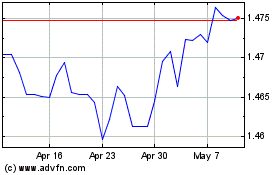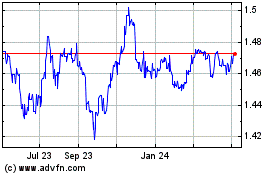Euro Remains Lower As ECB Chief Defends Stimulus Measures
May 10 2017 - 4:44AM
RTTF2
The euro remained lower against its major counterparts in the
European session on Wednesday, after the European Central Bank
President Mario Draghi reaffirmed that the bank is committed to
continue accommodative monetary policy for underlying inflation
pressures to build up and support inflation in the medium term.
Although incoming data has become increasingly solid and
downside risks vanish, it is too early to declare success, Draghi
said at the Dutch Parliament. Underlying inflation pressures
continue to remain subdued and have yet to show a convincing upward
trend.
He said the ECB is monitoring various effects carefully, and
taking into account price stability mandate. "The benefits of our
policy clearly outweigh potential side effects," Draghi added.
Political uncertainty against the backdrop of President Donald
Trump's abrupt dismissal of FBI Director James Comey also kept
underlying sentiment subdued.
The euro held steady against its major counterparts in the Asian
session, with the exception of the greenback.
The euro dropped to a 2-day low of 123.50 against the yen, from
a high of 124.32 hit at 3:30 pm ET. The next possible support for
the euro-yen pair is seen around the 122.00 zone.
Preliminary data from the Cabinet Office showed that Japan's
leading index rose to a 21-month high in March.
The leading index, which measures the future economic activity,
rose to 105.5 in March from 104.7 in February. This was the highest
since June 2015.
The single currency stayed lower against the pound, after having
fallen to near a 3-week low of 0.8383 at 2:15 am ET. The pair
finished Tuesday's trading at 0.8406.
The National Institute of Economic and Social Research said that
the Bank of England is likely to look through temporary spike in
inflation and maintain its record low interest rate until
mid-2019.
Consumer price inflation was projected to peak at 3.4 percent at
the end of 2017 before gradually returning back towards the BoE's 2
percent target.
The euro eased back to 1.0938 against the Swiss franc, from an
early high of 1.0969, and held steady thereafter. The pair was
valued at 1.0955 when it closed Tuesday's trading.
The euro dropped to near a 2-week low of 1.0859 against the
greenback in early European deals and remained lower in subsequent
part of trading session. The euro-greenback pair traded at 1.0873
at Tuesday's close.
The single currency hovered around an early 9-day low of 1.4878
against the loonie, compared to 1.4916 hit late New York Tuesday.
Further weakness may take the euro to a support around the 1.47
region.
The 19-nation currency slipped to a 6-day low of 1.4704 against
aussie and a new 2-week low of 1.5627 against the kiwi, from its
early highs of 1.4832 and 1.5805, respectively. The euro is likely
to challenge support around 1.45 against the aussie and 1.54
against the kiwi.
Looking ahead, at 12:00 pm ET, Boston Fed President Eric
Rosengren delivers a luncheon speech in South Burlington,
Vermont.
The U.S. monthly budget statement for April is set for release
at 2:00 pm ET.
Euro vs CAD (FX:EURCAD)
Forex Chart
From Mar 2024 to Apr 2024

Euro vs CAD (FX:EURCAD)
Forex Chart
From Apr 2023 to Apr 2024
